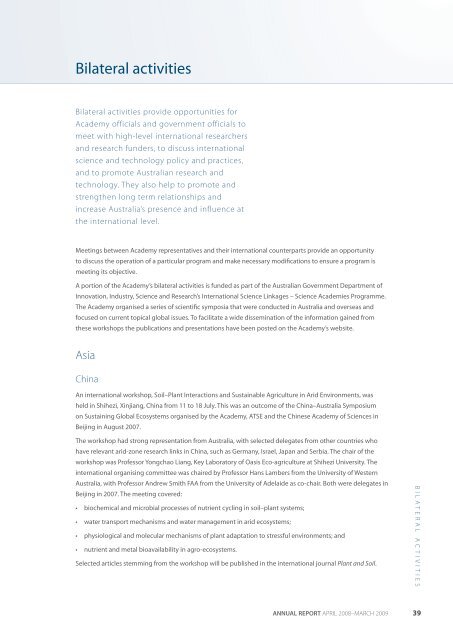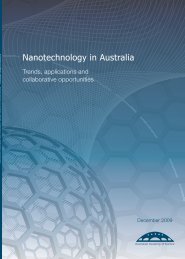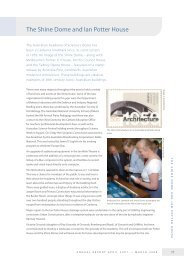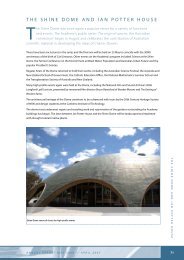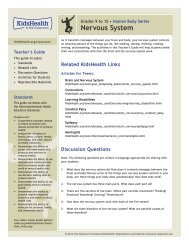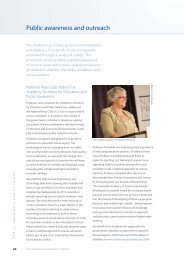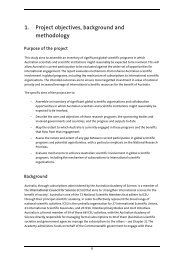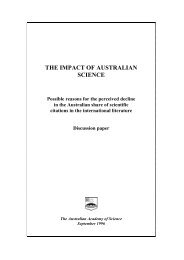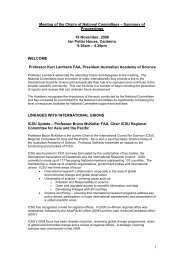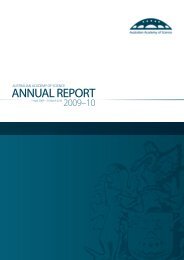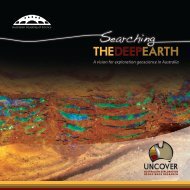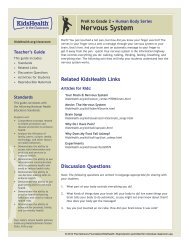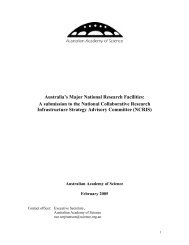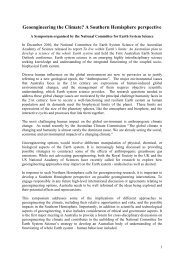full report - Australian Academy of Science
full report - Australian Academy of Science
full report - Australian Academy of Science
Create successful ePaper yourself
Turn your PDF publications into a flip-book with our unique Google optimized e-Paper software.
Bilateral activities<br />
Bilateral activities provide opportunities for<br />
<strong>Academy</strong> <strong>of</strong>ficials and government <strong>of</strong>ficials to<br />
meet with high-level international researchers<br />
and research funders, to discuss international<br />
science and technology policy and practices,<br />
and to promote <strong>Australian</strong> research and<br />
technology. They also help to promote and<br />
strengthen long term relationships and<br />
increase Australia’s presence and influence at<br />
the international level.<br />
Meetings between <strong>Academy</strong> representatives and their international counterparts provide an opportunity<br />
to discuss the operation <strong>of</strong> a particular program and make necessary modifications to ensure a program is<br />
meeting its objective.<br />
A portion <strong>of</strong> the <strong>Academy</strong>’s bilateral activities is funded as part <strong>of</strong> the <strong>Australian</strong> Government Department <strong>of</strong><br />
Innovation, Industry, <strong>Science</strong> and Research’s International <strong>Science</strong> Linkages – <strong>Science</strong> Academies Programme.<br />
The <strong>Academy</strong> organised a series <strong>of</strong> scientific symposia that were conducted in Australia and overseas and<br />
focused on current topical global issues. To facilitate a wide dissemination <strong>of</strong> the information gained from<br />
these workshops the publications and presentations have been posted on the <strong>Academy</strong>’s website.<br />
Asia<br />
China<br />
An international workshop, Soil–Plant Interactions and Sustainable Agriculture in Arid Environments, was<br />
held in Shihezi, Xinjiang, China from 11 to 18 July. This was an outcome <strong>of</strong> the China–Australia Symposium<br />
on Sustaining Global Ecosystems organised by the <strong>Academy</strong>, ATSE and the Chinese <strong>Academy</strong> <strong>of</strong> <strong>Science</strong>s in<br />
Beijing in August 2007.<br />
The workshop had strong representation from Australia, with selected delegates from other countries who<br />
have relevant arid-zone research links in China, such as Germany, Israel, Japan and Serbia. The chair <strong>of</strong> the<br />
workshop was Pr<strong>of</strong>essor Yongchao Liang, Key Laboratory <strong>of</strong> Oasis Eco-agriculture at Shihezi University. The<br />
international organising committee was chaired by Pr<strong>of</strong>essor Hans Lambers from the University <strong>of</strong> Western<br />
Australia, with Pr<strong>of</strong>essor Andrew Smith FAA from the University <strong>of</strong> Adelaide as co-chair. Both were delegates in<br />
Beijing in 2007. The meeting covered:<br />
• biochemical and microbial processes <strong>of</strong> nutrient cycling in soil–plant systems;<br />
• water transport mechanisms and water management in arid ecosystems;<br />
• physiological and molecular mechanisms <strong>of</strong> plant adaptation to stressful environments; and<br />
• nutrient and metal bioavailability in agro-ecosystems.<br />
Selected articles stemming from the workshop will be published in the international journal Plant and Soil.<br />
BILATERAL ACTIVITIES<br />
ANNUAL REPORT APRIL 2008–MARCH 2009 39


